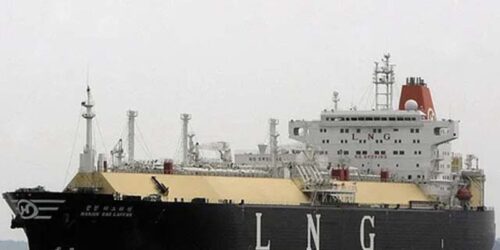The foreign and local sponsors of two upcoming merchant LNG (liquefied natural gas) terminals have complained to the prime minister that their projects are facing roadblocks despite approval by all institutional forums and they may not be able to go ahead with their investment plans in the prevailing conditions.
Informed sources told Dawn that both sponsors — Tabeer Energy of Mitsubishi Corporation Japan and Energas of three local business groups (Lucky, Sapphire and Halmore) — have reported to the government that they are fed up with bureaucratic wrangling over clear decisions of the federal cabinet and its committees as well as the Oil and Gas Regulatory Authority (Ogra) and could not commit final investment decisions (FIDs) to set up two private sector LNG terminals.
They told the government that the existing terminals set up with government’s guarantees and payments out of the public money for LNG processing were being given preference over the upcoming terminals, which did not demand any government guarantee or public fund, to discourage competition in the market.
The sources said Tabeer Energy had complained in writing to the prime minister that last week managers of Energas had met Minister for Energy Hammad Azhar and Petroleum Secretary Dr Arshad Mahmood to convey their frustration over the situation that was in contrast to the government’s decisions.
In a letter to the prime minister, Tabeer Chief Executive Officer Kosuke Makino alleged that the company and its “sponsors are not receiving any clear direction from the departments concerned for the allocation of pipeline capacity. Moreover, decisions of both the federal cabinet and Cabinet Committee on Energy (CCoE) are not implemented and regularly delayed”.
Copies of the letter were also sent to the ministers and secretaries of energy and maritime affairs, chairmen of Ogra and Port Qasim Authority, managing directors of two gas utilities and the Japanese ambassador in Islamabad.
The letter said Mitsubishi Corporation and its wholly owned subsidiary Tabeer Energy had been trying to establish an LNG terminal at Port Qasim for the past three years that would be the first private terminal in Pakistan and in contrast to those established earlier requires no government funding or utilisation guarantee. Yet “unfortunately, the development of the project has been marred with ambiguities, delayed decision making and resistance from the prevailing status quo of pipeline companies”.
The company regretted that even a series of decisions by the cabinet, CCoE, inter-ministerial committees and Ogra over the past two years had “not resulted in allocation of pipeline capacity”, adding that an inter-ministerial committee had decided on February 19 last year that the allocation of pipeline capacity “will be completed by May 2020”.
With a delay of three months in the deadline on October 19 last year, the Petroleum Division allocated provisional capacity of up to 400 million cubic feet and asked Tabeer to complete all formalities while directing SSGC and SNGPL to facilitate capacity allocation, it said.
The CCoE had on February 23 this year allocated pipeline capacity on a “firm basis” and directed SSGC/SNGPL to facilitate this allocation. As a follow-up to the CCoE decision, Ogra had directed the gas companies on September 2 “to allocate 250-300mmcfd (million cubic feet per day)” within September this year.
“However, despite three years having passed and despite the CCoE as well as Ogra directing SSGC/SNGPL to allocate pipeline capacity”, the two gas companies had not allotted the pipeline capacity, the letter said.
Instead, it added, SNGPL claimed that only 100mmcfd of pipeline capacity was available that could only enable 10 per cent of RLNG from the terminal to reach the demand centre i.e. north of Pakistan. This “is also in stark difference to the capacity allocated by the Ministry of Energy and the regulator, Ogra”.
The letter said it had now come to know that Ministry of Energy and SSGC/SNGPL were now allocating the pipeline capacity on a “three-month rolling basis” rather than a “firm basis for long-term”. It said Tabeer Energy “will not be in a position to accept the current capacity being given i.e. 100mmcfd by SNGPL” because it would become “extremely difficult” to undertake this investment for 30 years.
The Tabeer CEO requested the prime minister to take notice of the “confusion and delay that is being meted” to the establishment of its project and order implementation of CCoE’s decisions on the issue. “A business environment where decisions of the cabinet and CCoE are not implemented, where a genuine and immediate need of gas is ignored and where there is no consistency of policy and direction, is not conducive to attract foreign investment,” he said.
Early this month, the CCoE had again “approved the allocation of pipeline capacity (300-350mmcfd each to both terminals) and directed [the authorities concerned] to fast-track the work on setting up new LNG terminals” when the Ministry of Maritime Affairs reported that the gas companies were “reluctant to allocate pipeline capacity” and were flouting various decisions and orders of the government and the regulator.





